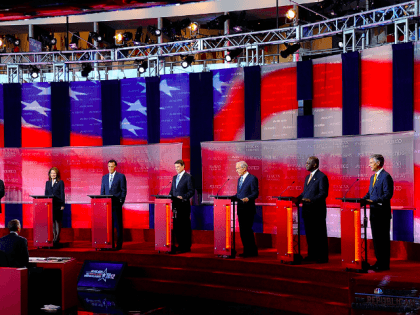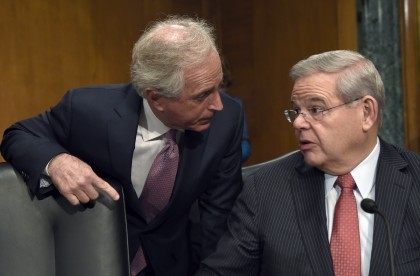Iran Deal: White House Lauds Iranian Self-Inspection
On Monday, the Obama White House praised Iran for cooperating with international inspectors–as Iran inspected its own military facility for evidence of nuclear activity.

On Monday, the Obama White House praised Iran for cooperating with international inspectors–as Iran inspected its own military facility for evidence of nuclear activity.

The Iran deal will fail to muster enough votes to override an anticipated presidential veto. In the Senate, it may even fail to gather enough votes to stop Democrats from filibustering. The fact that Minority Leader Harry Reid wants to protect his members from having to vote on the Iran deal at all tells us exactly how bad it is. But it also tells us how weak the Republican opposition to the Iran deal has been from the start. And there must be political consequences.

President Barack Obama’s announcement that he will approach the UN Security Council to approve the nuclear deal with Iran, and rescind past resolutions and international sanctions, before Congress approves the agreement, came as something of a surprise to many. When Congress passed Sen. Bob Corker’s Iran Nuclear Agreement Review Act, and President Obama signed it into law in May, the public understanding was that Congress would have the final say.

Several Republican presidential candidates have already reacted to the Iran deal by declaring that they will “terminate” it immediately upon reaching office. That may be an effective way of conveying the depth of GOP opposition to an agreement that facilitates Iran’s emergence as a regional hegemon and potential nuclear power. It is also a constitutionally valid policy, since President Barack Obama has absurdly declared that the Iran deal is an executive agreement, and not a treaty, to minimize scrutiny and opposition. It is not, however, the best response.

Defying threats of a presidential veto, critics of the Iran deal reached a bipartisan compromise on Tuesday that will allow the Iran Nuclear Agreement Review Act–the “Corker-Menendez bill”–to proceed to a vote with a veto-proof two-thirds majority. The White House has backed down, fearing the embarrassment of a veto override on a key foreign policy issue. Yet the conditions that critics of the Iran deal had to accept will, in fact, make the deal easier to pass in its current form.

The Iran Nuclear Agreement Review Act appears to be the most effective way for Congress to stop President Barack Obama from appeasing the Iranian regime with a bad nuclear deal. The “Corker-Mendez-Graham” bill, or the “Corker Bill,” would require President Obama to submit the final Iran deal to Congress. Yet the text of the bill now before Congress would actually make an Iran deal easier to approve–and would do so by gutting the Senate’s constitutional power over treaties.

Senator Tim Kaine (D-VA) said that the White House has “taken the position” that “Congress shouldn’t be weighing in” on an Iran deal on Wednesday’s “Morning Joe” on MSNBC. When asked how the White House has reacted to his support

Following his stirring address to a joint session of Congress on Tuesday, Prime Minister Benjamin Netanyahu will return home, having made his point about the dangers of the Iran deal currently on the table. The question is: what next for Congress? President Barack Obama has vowed to veto any new sanctions–and may have sown enough division in his party to prevent an override. Yet there is another bill in the works that, after Tuesday, Obama may find he cannot refuse.
